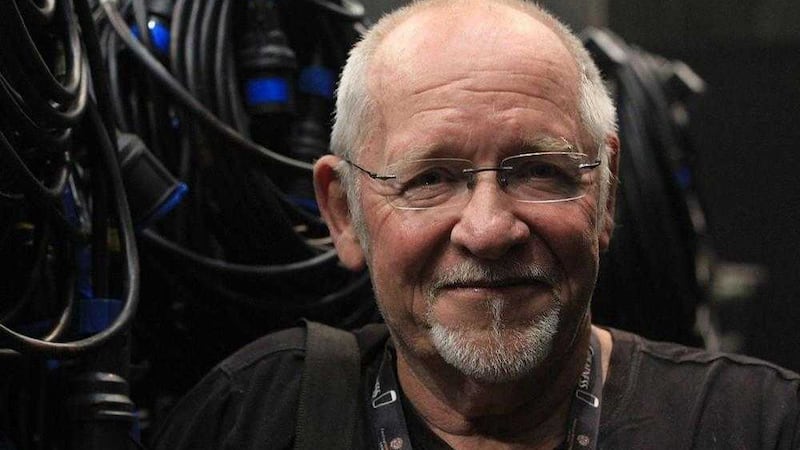ERIC Bogle laughed and then apologised when I told him he was responsible for one of the greatest musical disappointments of my life.
Leaving Nancy was always a song I would sing in my head when out walking or doing the ironing and a more romantic song you couldn’t imagine as the singer heads off on a long journey: “In comes the train and the whole platform shakes/It stops with a shudder and a screaming of brakes/The parting has come, and my weary soul aches/I’m leaving my Nancy, oh.”
It turns out Eric wasn’t singing about a pair of star-crossed lovers but about his mother!
“Sorry about that, Robert.” he laughs and immediately is forgiven.
Nancy Bogle was an office cleaner and worked in a hardware store while Eric’s father worked for British Rail until he was made redundant during the Beeching cuts of the 60s so would have known the hardships and unfairness of life as he grew up and it stayed with him, even after he emigrated to Australia aged 25 in 1969 and where he has been living ever since.
Leaving Nancy – it still is a great song, as are so many the Scot has written and continues to write but Eric is coming to do two concerts, one at The National Concert Hall in Dublin, on 31 August and the other in the Elmwood Hall in Belfast 1 September. Both Irish gigs are associated with the Battle of The Somme Centenary commemorations and the Irish regiments who fought in this horrific battle.
Despite a long career, it is his 'war songs' that will be most remembered about Eric Bogle. No Man’s Land (The Green Fields of France) and And The Band Played Waltzing Matilda are fierce indictments of “man’s blind indifference to his fellow man”. And they will have a special significance given that 2016 is the centenary of the Somme and also of the end of the Dardanelles campaign which saw Irish, Scots and Australians die in the service of the empire.
I say to Eric that we in Ireland have an ambivalent attitude to the First World War and the Willie McBrides who fought and died in it. Eric himself refers to it in another song, The Lily and the Poppy, and when I ask him about it, he sighs at the utter complexity of it all.
“The reasons that a lot of Irish lads enlisted and fought and died in France were many and varied,” says Eric, who even as a young man devoured history books. “Poverty was one of them, probably the main one. The second one was that they were young men who were just looking for a bit of adventure.
“Patriotism for Ireland? Perhaps. But I’ve often said that there never was one actual soldier called Willie McBride that I wrote about. I didn’t sit by the grave of a Willie McBride to write the song, that would be bulls**t. But I wanted to remind people that a lot of Irish lads had died fighting for king and country during WWI as well because when I wrote it in 1975, the IRA bombing campaign on the UK mainland was in full swing and there was a lot of anti-Irish feeling about and I just thought, ‘Well, here’s a wee subtle dig at the haters’.
“It was so subtle that most people missed it, of course,” he laughs, “but I don’t like to harangue or shove a point down people’s throats in my songs.” (He has also written a song about Bobby Sands called The Sign.)
And the Band Played Waltzing Matilda came about when Eric attended an ANZAC parade to remember the Australians who fought in the FIrst World War and especially the battle at Gallipoli where there were 28,150 Australian causalities, 8,709 of whom died on the battlefield.
'But the band played Waltzing Matilda, when we stopped to bury our slain/
We buried ours, and the Turks buried theirs, then we started all over again.'
Last year Eric played a concert at the site of the slaughter at Gallipoli, something he had refused to do because “the thought of singing for all those ghosts has always intimidated me”.
It was around 3 or 4am when he got to sing the song and his knees were shaking not because of the cold but because of the crushing emotion of the event. When he finished, no doubt those ghosts were giving Eric a standing ovation somewhere in the afterlife, glad that someone had the courage to tell it like it was.
But it is important to note that Eric Bogle is more than just someone who sings about war. His new album Voices is full of humour and humanity that has marked him throughout his career.
One of the songs is called Ballad for Billy, written by Simon Wilkins for his late nephew, Billy Spencer: who was 26 years when he lost his life in a tragic accident.
“His parents donated his organs to help others; his heart went to a young father of three beautiful daughters. Later Bill’s mum and dad listened to their son’s heart beating in that young father’s body. Imagine that if you can."
The song was written by Simon the night after Bill died; Eric really liked the song and recorded it.
He is a great storyteller and this article could have been four times as long but at least you can head to the Elmwood Hall on September 1 for what could be his last gig in Ireland. (For tickets see ticketmaster.ie)



